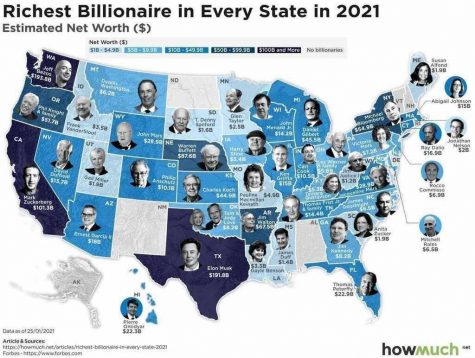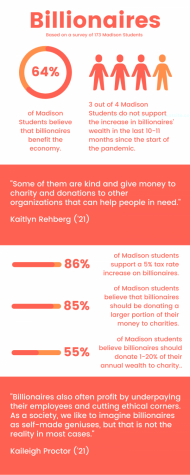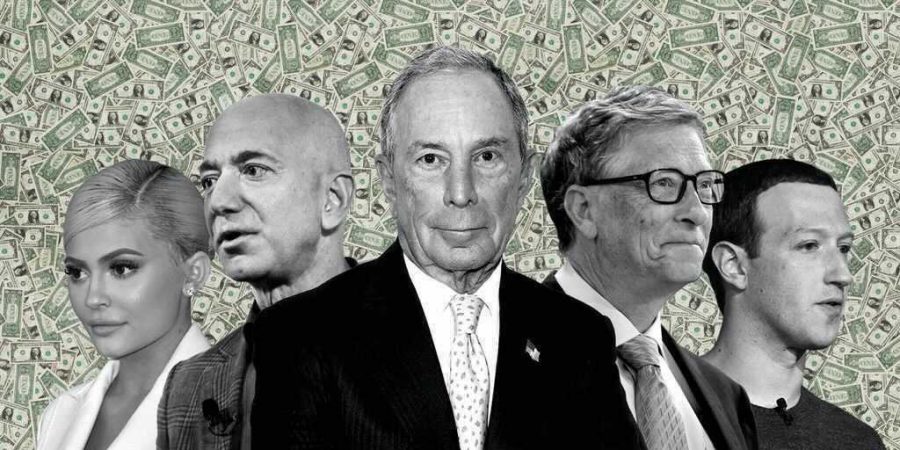The Controversial Debate: Are Billionaires Good or Bad?
March 7, 2021
Over the past year, nearly every class of Americans has seen massive economic hardships, except for the world’s billionaires, who have continued to sustain financial gains during the pandemic. Since mid-March 2020, the billionaire class has added over $1.1 trillion dollars in wealth, an amount of money that could pay for the near entirety of the COVID-19 relief bill. The industries controlled by these billionaires were able to take advantage of the pandemic through products and services in high demand, increasing their wealth even further. For example, Whole Foods delivery became an extremely profitable service, due to owner Jeff Bezos’ capital increase of 61%. Meanwhile, 52% of lower-income adults reported someone in their household experiencing job upheaval.
Billionaires are at the top of the economic food chain. Even prior to COVID-19, U.S. billionaires have built up wealth, increasing the economic gap in our country. But how did billionaires get so rich? According to Forbes 400, 127 U.S. billionaires have inherited their money, and the other 273 are self-made. Many of these billionaires earned their wealth through the finance and investment industries, as it’s the most common industry to make large profits quickly. This includes Warren Buffett, the third richest man in the world, and Mark Cuban, known for being featured on the reality TV series “Shark Tank,” who is constantly investing in new companies. James Monsees and Adam Bowen, co-founders of Juul Labs, gained their billion dollar profits by selling nicotine vaporizers.

Furthermore, the fashion and retail industry includes about 11% of U.S. billionaires, such as Francoise Bettencourt Meyers, who inherited L’Oreal and is the richest woman in the world. There is also the real estate industry, selling homes and leasing space to companies. The most famous billionaire in this industry is former President Donald Trump, with a net worth of $3.1 billion. And, in this day and age, there are many self-made billionaires earning profit through technology, including mobile apps, enterprise softwares, and other technical gadgets. Jeff Bezos, for instance, is the founder of Amazon—an online service and shopping business- and is worth around $184 billion as of March 2021. Then there’s Elon Musk, leader of aerospace company SpaceX, leader of Neuralink, a company dedicated to curing neurological conditions with the use of advanced technology, and CEO and co-founder of the car company Tesla. Additionally, Musk is head of the global manufacturing, product design and engineering of the electrical vehicles, and also oversees the production of battery and solar energy products. This puts him at a net worth of $167.1 billion as of March, losing his spot as richest man in the world after he lost $15 billion when Tesla shares plummeted. Both net worths will continue to fluctuate.
There are many differing opinions on billionaires. Some liken the class with vampires, while others see them as self-made entrepreneurs. Throughout the pandemic, these ideologies have only become more polarized. Much of the former group cites the growing wealth disparity within the U.S., the overuse of child labor and diminishing income growth as reasons for their belief. The latter discusses the creation of jobs and necessary innovation that billionaires have the means to create.
The expansion of billionaires’ wealth over this period of extreme struggle for the proletariat has caused many to assume the increasingly popular stance that billionaires should not exist. This belief, frequently adopted by leftists, discusses the overabundance of wealth held by billionaires, citing facts such as that the three wealthiest men in the world hold more money than 160 million Americans combined. In addition, many discuss the ethics of gaining such wealth, considering that, in order to achieve the prices that make them competitive, billionaires frequently use child labor from nations such as China. From some economist’s perspectives, the mere existence of billionaires is also threatening.
“There should be no billionaires anywhere in the world until there are no people below the poverty line anywhere in the world,” Simon Wong (’24) said.
For instance, French economist Thomas Piketty said that from 1950-1990, the U.S. per capita income growth was 2.2% per year, while following a massive increase in billionaires in the 90’s and 2000’s, that same income growth dropped to 1.1%, increasing the wealth disparity within the U.S. This implies that billionaires as a whole have been paying their workers far less than they should to properly stimulate the economy.
Despite the criticisms of billionaires, many of them have drastically changed the lives of Americans, and even the lives of people across the globe, for the better. Amazon has completely transformed the way people shop, and it’s become one of the most valuable brands worldwide. Jan Koum and Brian Acton, founders of WhatsApp, changed the way people communicate internationally. All that’s needed is a WiFi connection to talk or text with people on the other side of the planet.
Hence, we see that the majority of successful American billionaires reveal an evident pattern: they have created or taken technology and used it to their advantage in order to improve the way people live, work, and communicate.
“Bezos is promoting a service that millions of people are using on a daily basis to produce their social contact with people in order to get products that they want,” economics teacher Andrew Foos said. “Bill Gates’ company is producing computers and services that allow people at school and businesses to meet without having to be in person, so they’re producing a lot of value in the economy through the work that they do.”

In turn, billionaires make an enormous profit and gain high social and economic status due to equity ownership in these businesses. In the process of all this, billionaires also achieved something else: producing thousands of new jobs and opportunities for others, as well as donating to charities and even establishing new ones.
“Some of them are kind and give money to charity and donations to other organizations that can help people in need,” Kaitlyn Rehberg (’21) said.
The wealth of billionaires plainly symbolizes the value they have added to society. By ridding the world of billionaires, it could eliminate the motivation for others to create new, transformative products that could lead them to the path of becoming a billionaire themselves, as well as current billionaires’ incentive to continue innovating. Innovation is what has moved not only America, but also the world forward, and it’s improved many different aspects of the lives of millions of people.
Whether or not billionaires should exist, especially during times of economic hardship, is a widespread and controversial debate that has existed since the world’s first billionaires came to be. There are multiple points to both sides. There’s the idea that billionaires benefit the economy through jobs and donations, inspire others to work hard, and create innovations that have propelled the world forward. Contrary to that notion, there is the idea that billionaires are selfish, due to the idea that they don’t donate a sufficient amount of their money. In addition, some think that billionaires don’t even need their money, and that they are simply power-hungry. Regardless of the differing views, the only certain aspect of this topic is its controversiality.



